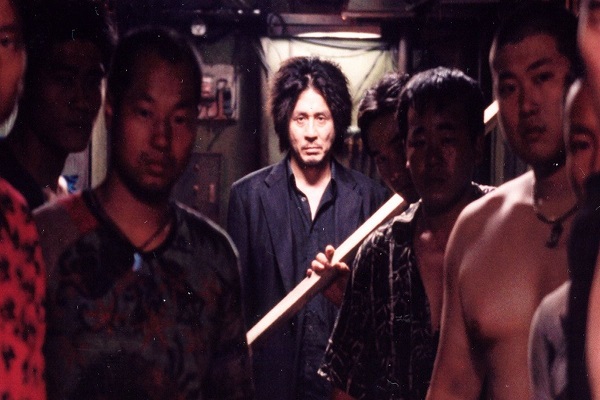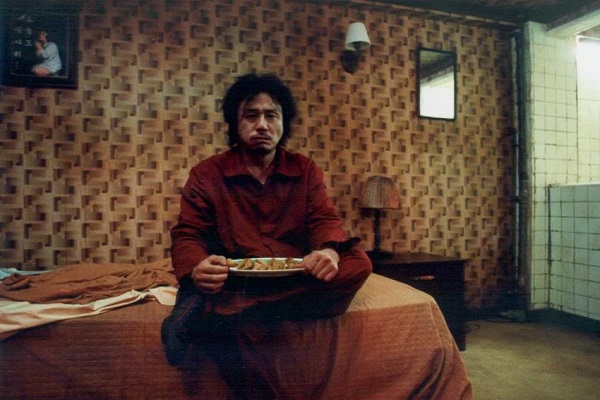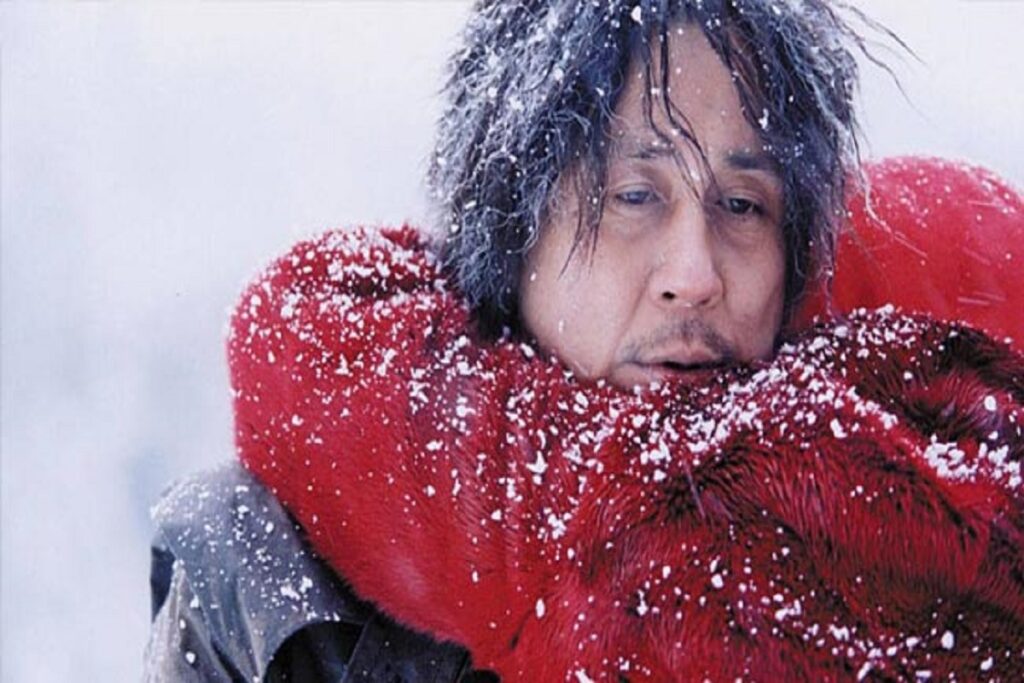Park Chan-wook’s neo-noir crime thriller film Oldboy is more than a simple revenge saga. The film brutally reveals the dark side of human psychology. Human minds and hearts are not always filled with love, care, affection, sympathy, and peace. Unfortunately, the world experiences crime, revenge, lust, incest, massacre, oppression, and bloodshed every day. Movies are not always made up of the brighter sides of life. Cinema is not always a collection of goody-goody images. Through Oldboy, filmmaker Park Chan-wook reaches the negative sides of human souls as far as possible. A drunken businessman is abducted from a police station and kept captive for long fifteen years. However, the victim knows neither the captor nor his objective. Initially, he can’t figure out his fault. However, when he comes to know the reason for his captivity, the captor has already made him commit one of the worst sins. The film vividly shows that tormented human memories never get erased. However, it also shows that negativities only bring negativities. Killings only result in killings. Revenge never brings satisfaction.
The story of Oldboy starts in 1988. A drunken businessman named Oh Dae-su (Choi Min-sik) is arrested and taken to the police station, because of which he misses his daughter’s fourth birthday. His friend Joo-hwan (Ji Dae-han) visits the police station and takes him out. However, quite mysteriously, Oh Dae-su is abducted and kept captive in a makeshift prison that looks like a hotel room with a bed and a television. Foods are supplied through a small door below. However, he knows neither his crime nor the objectives of the captors. An utterly depressed and agonized Oh Dae-su attempts suicide. However, he is provided with medical help as if the captors intend to make him suffer. In the lonely hotel room, he intensely practices shadowboxing.

One day in 2003, Oh Dae-su is suddenly tranquilized, hypnotized, and released from the hotel room. After fighting a few petty criminals, he enters a sushi shop and meets a young chef named Mi-do (Kang Hye-jung). They subsequently bond well and fall in love. Dae-su starts searching for his daughter and comes to know that she was adopted when he was kept captive. He tracks down the restaurant that served food for him in the prison and also the prison.
Dae-su meets, tortures, and interrogates the prison warden Mr. Park who reveals that Dae-su was captured because he talks too much. Park’s bodyguards attack Dae-su and they fiercely fight in the corridor. Dae-su defeats them with only a hammer. However, he gets the most crucial information that his captor’s name is Lee Woo-jin (Yoo Ji-tae) who gives him an ultimatum of five days to find out the motive behind his captivity. If Dae-su becomes successful, Woo-jin will kill himself, but if he fails, Woo-jin will kill Mi-do. Woo-jin kills Joo-hwan when he was about to share some crucial information with Dae-su. Dae-su recollects the memories of his schooldays when Woo-jin was his classmate and he accidentally witnessed his incest with his sister. Even though Dae-su revealed this utterly sensitive information to only Joo-hwan, it got leaked to everyone in the school. A rumor was spread out that Woo-jin’s sister was pregnant. Being utterly tormented, she committed suicide. So, his captivity is nothing but Woo-jin’s terrible revenge on him.
Dae-su goes to Woo-jin’s apartment for taking revenge. Through Dae-su’s family album kept in a purple box inside his apartment, Woo-jin establishes the fact that Dae-su has actually committed incest. Mi-do is none other than his own daughter. An utterly despaired Dae-su asks for forgiveness from Woo-jin by barking like a dog and then cutting his tongue off so that his sin does not get revealed to the world. When Dae-su presses the remote to stop Woo-jin’s pacemaker, the audio of his incest with Mi-do is played on the speaker. Woo-jin forgives him but kills himself inside the lift. Later, Dae-su urges the hypnotist to erase his memory so that he and Mi-do can stay together. In the end, Dae-su and Mi-do are seen together in a snowy landscape. Mi-do expresses her love for Dae-su and Dae-su reciprocates with a gentle smile. However, his smile slowly turns into a bizarre mixed emotion.

One of the most important aspects of Oldboy is that it takes a strong reference to the Greek king Oedipus, who accidentally fulfilled Apollo’s prophecy by killing his father and marrying his mother. He committed a sin by engaging in incest with his own mother. However, when this infamous incest got revealed to the world, his mother committed suicide by hanging and Oedipus gauged out his eyes. This mythological tragedy can be related in two ways in the film. When Woo-jin’s incest with his own sister got revealed to the world, his sister committed suicide by jumping into the river, and much later, he kills himself by shooting in the lift. On the other side, Dae-su too commits incest with his daughter Mi-do. He insults himself by barking like a dog in front of Woo-jin and then cuts his tongue off so that it does not get revealed to his daughter. So, “Oldboy” features two unfortunate incest stories wherein characters face similar fates like Oedipus and his mother.
Oldboy will always be remembered for multiple iconic scenes. The corridor fight scene featuring Dae-su versus Mr. Park’s bodyguards was shot in one take. The final take was selected after seventeen takes of the shot. This shot has received iconic status over time and is widely considered one of the most difficult and dynamic shots in entire cinema history. Another famous shot in the film is when Dae-su eats a live octopus. Even though it looks like an alive octopus in the film, actually, there were four dead octopuses and those were cut into pieces before the filming. Choi Min-sik who plays Dae-su in the film indeed ate those but before eating, he asked for forgiveness from the octopuses. Through this scene, filmmaker Park Chan-wook portrays the brutal side of Dae-su’s character.
The viewers find it difficult to hold their tears when Woo-jin leaves his sister’s hand and she falls into the river. Woo-jin’s incestuous activity was revealed to his classmates. They even spread the horrific rumor that Woo-jin’s sister got pregnant. So, it was not possible for her to continue with an utterly humiliating life. Probably, Woo-jin could not tolerate the excruciating suffering of her sister. So, he did not have any other option but to leave her hand. No brother wants to see his sister’s death in this world. So, viewers can feel the utmost helpless situation of Woo-jin. Just before he shoots himself inside the lift, he stretches his hand, as if he is leaving his sister’s hand before she falls into the river. Even after so many years of the incident, he still gets tormented by those horrendous memories.
One of the most interesting scenes in the film is the conversation between Dae-su and Woo-jin in Woo-jin’s posh but vacant apartment. Both characters are captured through mirrors multiple times during the conversation. Through this scene, filmmaker Park Chan-wook charismatically portrays their rivalry on the screen. Even though apparently they are looking at in different directions, their minds and concentrations are definitely on each other. Park’s elegant filmmaking style using mirrors is reflected in the conversation. It shows how engaging, revengeful, and thrilling a conversation can be on the screen.
Even though Oldboy is loosely based on the Japanese manga of the same name, it is actually made up of Chan-wook’s own brutal imagination. He strongly believes that cinema is not only representative of positive thoughts or emotions but also violent or destructive tendencies. Those tendencies are also a crucial part of human psychology. So, a very strong and influential artistic medium like cinema can’t ignore those. However, Chan-wook also clearly shows that a destructive mentality or tendency only brings destruction, and in the process, those human beings destroy themselves as well. After watching this film, viewers get tired or disturbed not because of the violent action scenes, instead, they get tired of the purpose behind those scenes. The screenplay and dialogues reflect those purposes.
Overall, Oldboy is a dynamic, fast, rough, action-packed, thrilling, revengeful, and very well-made neo-noir film. The actors are able to portray the revenge and violence that their characters seek for. Min-sik as protagonist Oh Dae-su delivers an outstanding performance. Even, he did not step back in eating raw octopuses. Dae-su’s vengeance is vividly reflected in Min-sik’s acting and facial expressions. The vengeance is very well reflected in Yoo Ji-tae’s portrayal of the tormented and revengeful character Woo-jin. Kang Hye-jung as Mi-do is vivacious, but pain-stricken when she meets Dae-su, who has cut his tongue off, on the snowy landscape in the end.
The cinematography of Oldboy by Chung Chung-hoon is remarkable. Chung-hoon’s dynamic camera brilliantly captures fast, rough, low-saturated, and violent images throughout the film. The viewers get astonished by the fact that they are watching the worldly characters and not the superheroes. Chung-hoon captures the close-up shots through long lenses with shallow depth of field, which generate little distorted images that create tense and thrilling effects on the screen. However, he captures the conversations through wide-angle lenses to cover both parties well and establish the background. The mirror shots of the conversation between Dae-su and Woo-jin in Woo-jin’s apartment were created by filming both of the characters’ dialogues separately and then merging them through computer graphics.
Chung-hoon’s remarkable thrilling cinematography creates multidimensional impacts in Oldboy, which is well justified by Kim Sang-bum’s dynamic editing. Music director Cho Young-wuk uses waltz multiple times in the film to match the rhythm of the scenes. His music resonates with the vengeance depicted in the film. The production design of the film is well-thought and justified as per the story. The prison is given a shape of a hotel room to indicate that this is a private and makeshift prison. The captors spend lumpsum amount to avail of the facility. On the other hand, Woo-jin’s posh apartment is left vacant without much decoration to portray his spiritual emptiness. Oldboy is widely considered a cult film and won numerous awards all over the world. It was nominated for the prestigious Palme d’Or and won the Grand Prix at the 2004 Cannes Film Festival.
